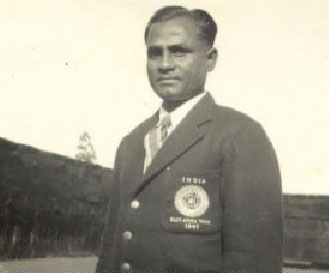GOAL!
Autobiography of Hockey Wizard Dhyan Chand
Published by Sport & Pastime, Chennai, 1952
 was
born in Allahabad on August 29, 1905. I come from a Rajput family which settled
in Allahabad and later migrated to Jhansi. And Jhansi is now my home.
was
born in Allahabad on August 29, 1905. I come from a Rajput family which settled
in Allahabad and later migrated to Jhansi. And Jhansi is now my home.
My father was a soldier and so was my elder brother, and when I was sixteen,
naturally I also joined the army as a Sepoy. We are three brothers, and you all
perhaps know more about my younger brother Roop Singh than myself, as far as
hockey is concerned.
I could just read and write. I was not destined for any higher education. I
joined the First Brahmin Regiment in Delhi in 1922 as a Sepoy. I do not remember
whether I played any hockey worth mentioning before I joined the Army. I do
remember occasionally indulging in hockey in Jhansi with my friends, comrades
and playmates, not in any methodical manner, but just for the fun of it. Roop
Singh at that time never touched a hockey stick, nor showed any fondness for it.
I realise that I am not a very important man, good enough to write an
autobiography, but I feel tempted to let my friends know a little bit of my
private life as well. Therefore, I hope you will forgive me if before touching
on my hockey career, I give a short picture of my military career.
As I said before, I joined the Army as a Sepoy in 1922. When I
received my first pay of a few rupees, you cannot imagine what a thrill it was
to me. I could then never dream that from a Sepoy without much academic qualification, I
would be raised to the rank of a Captain in the Indian Army. I feel very proud
of it.
In 1927 I was made a Lance-Naik. In 1932 when I was a member of the Indian
team for the Los Angeles Olympics, I was a Naik. In 1936 when I captained India
in the Berlin Olympics, I was an Other Rank.
I received the Viceroy's Commission and was promoted as a Jamadar in 1938,
and it took me four years to become a Subedar. World War II was then in
progress. I was given a King's Commission and made a Lieutenant in 1943.
Then our country won freedom and I am proud that I got my Captain's rank in 1948
in a free India.
When the First Brahmin Regiment was later abolished, I joined the 2/14 Punjab
Regiment. I received my King's Commission when I was on training duty at
Ferozepur for seven years. I also put in, for a brief period, active service in
China.
I had a lucky escape once. My regiment was stationed in China in 1942,
and fortunately for me, I was sent back to Ferozepur just six months before my
entire regiment was captured by the Japanese. When the country got divided, I was in the border town of Ferozepur, and
naturally I opted for India.
This in a nutshell is the march of my life. I am now the proud father of five
children, and not even hockey, which has always been my first love, can lure me
away from my family.
Let me start with a chronological listing of the outstanding hockey activities of
my life, before proceeding to the details. In 1926 I was a member of the Indian
Army team that toured Australia and New Zealand.
I believe that was the first
occasion when Indians played hockey abroad, except when some Indian students in
Oxford and Cambridge Universities occasionally took teams to
the Continent during vacations. In 1928 when we toured in Europe and played in the Olympic Games in
Amsterdam, Indian hockey was not quite unknown in the Continent because of the
pioneering work done by the Indian students.
I first captained India in 1934 in the Western Asiatic Games in Delhi. In
1935 I was the substitute captain for the Indian team which toured Australia and
New Zealand. The Nawab of Manavdar was chosen as the captain of the team, but as
he could not undertake the tour, the responsibility of leading our team fell on
me.
But the biggest and highest honour that came to me in hockey was in 1936
when, for the first time, I captained India in the Olympic Games, though I had
represented India in two earlier Olympic Games.
In 1947-48 when I was leading a more or less retired hockey life, playing the
game only sporadically, I was somewhat surprised when the Indian Hockey
Federation invited me to lead an Indian team to East Africa. I learnt later that
the East African people had, before extending the invitation, made it a
condition that I must accompany the team. With this tour came the end of my
career in first class hockey.


Dhyan Chand in East Africa, photograph courtesy Olympian Pat
Jansen

